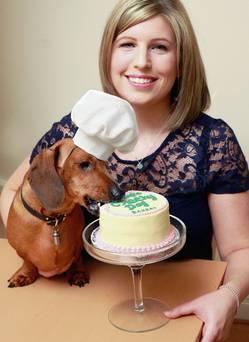New law on micro-chipping your dog
In the Republic of Ireland from 31st March 2016, it will be compulsory for all dogs to be microchipped.
As a dog owner, there are three things you need to know about the new legislation:
- Your dog must be microchipped and registered on a government approved database by 31st March 2016.
- You must have a certificate from a government approved database to prove that your dog is microchipped and registered on that database.
- You must keep your contact details up to date. Any changes of ownership or of contact details, such as address and phone numbers, must be notified to that database.
If you are buying, selling or transferring ownership of a dog, you will also need to know the following:
- From 1st September 2015 all puppies must be micro shipped and registered with a government approved database by the time they reach 12 weeks of age or before they are moved from their birth home.
- It is illegal to buy or take ownership of a puppy that is not microchipped and registered on a government approved database and that does not have a certificate from the database to prove this.
- You must inform a government approved database when you buy, sell, take ownership or transfer ownership of a dog.
If your dog is already microchipped, you still need to make sure your details are stored correctly on a government approved database and that you have a certificate to prove this.
Hounds for Love: Yes Equality





Baxter insisted we came with him to today's Hounds for Love: Yes Equality bank holiday stroll in support of marriage equality at Sandymount Strand today.
A big thanks to the kind man who gave Baxter his bandana. And thanks to Seamus Dooley, who invited us along!
The lambing season approaches, so dog owners need to be vigilant

With lambing season approaching, it is time for us as dog owners to be vigilant and not let our pets near farms.
With spring just around the corner, here at Petfriendly Ireland we are gearing up for a year of new adventures and planning some great dog friendly walks around the country.
However, with spring also comes lambing season, which means it is also time for us to be vigilant when out walking with with our dogs in the countryside.
All dogs, from family pets to working dogs, can potentially cause a lot of distress and damage if they are not kept under control. At this time of year, sheep flocks have a lot of heavily pregnant ewes, many of which will start lambing in the coming weeks and months.
Sheep worrying by dogs can be a massive concern at this time of year. Even seemingly harmless family pets can cause serious damage if they turn on a flock of sheep.
A dog attack on a sheep flock is extremely stressful and can inflict savage injuries, often fatal. Aside from the economic losses for the farmer, for which dog owners can be held liable, the welfare implications for the flock can be very severe and long-lasting. Sheep never recover fully from a dog attack and can suffer ongoing difficulties, including reproduction problems and increased nervousness.
With up to 2.5 million lambs on 30,000 sheep farms across the country expected to be born by the end of the lambing season this year, it's important that we don't let our dogs cause any unnecessary stress for the sheep.
So, it's important that we keep the safety of the sheep flocks in mind and follow two simple rules when walking with our dogs near farmland:
- keep to the footpaths
- keep our dogs on leads at all times
Dog Friendly Cork - A Fantastic Initiative

Dog Friendly Cork is a fantastic initiative, with a facebook page for dog-lovers living in or visiting Cork who are looking to share dog-friendly tips and information.
The Dog Friendly Cork Facebook page aims to find dog-friendly facilities, services and events at which dogs are welcome, and to share information and tips on dog-friendly accommodation, parks, walks, beaches, shops, restaurants; in fact, anything pet-friendly really.
The Dog Friendly Cork Facebook page also lists dog-friendly social events, such as the Dog Walking Club, and a campaign for a dedicated dog park in Cork.
We're certainly looking forward to our next visit to Cork with Baxter.
See ‘Dog Friendly Cork’ on Facebook for a full list of pet friendly information.
There’s also a really interesting article on Dog Friendly Cork in the Irish Examiner http://www.irishexaminer.com/lifestyle/features/paws-for-thought-with-dog-friendly-cork-264532.html
Code of Conduct for dog owners visiting Dublin's parks and gardens
The OPW have issued a Code of Conduct for all dog owners visiting national historic properties in Dublin with their dogs.
The Code of Conduct for Dog Owners identifies specific areas within the OPW's twelve parks and gardens in Dublin where dogs are not permitted or must be kept on a lead. The parks and gardens included are St Stephen's Green, Iveagh Gardens, National War Memorial Gardens, Grangegorman Military Cemetary, Arbour Hill Cemetary, Pheonix Park, Royal Hospital Kilmainham, National Botanic Gardens, St Enda's Park, Rathfarnham Castle, Garden of Remembrance and Castletown House.
For full details and to download a PDF copy of the OPW's Code of Conduct for Dog Owners, please click here
Meet the dog lover behind Dublin's Cheeky Dog Bakery

Recently at a DSPCA Doggie Day Out in St Enda's Park in Rathfarnham, Baxter and I came across a yummy new service just for dogs. Though we all know that cakes and sweets are not healthy for our dogs, it is great to see a new way of providing tasty treats for pooches.
Cheeky Dog Bakery began two years ago after dog lover Jenny McCarthy struggled to find a birthday cake to celebrate her dachshund Oscar's first birthday. Unable to find one, she decided to make her own. Much to Oscar's delight!
Inspired by her own attempt a baking a birthday cake for Oscar, she spent a year researching and testing recipes and acquiring all the necessary skills to set up her own dog bakery.
Jenny runs the successful Cheeky Dog Bakery online, selling everything from donuts to birthday cakes for dogs.
All her dog treats are hand made with dog friendly ingredients using only natural human grade organic ingredients, including carob, as dogs should never eat chocolate.


Jenny’s dog treats include a Birthday gift box, which contains a large two-tier cake cookie, a large Happy Birthday bone with paw and heart detail, two gift cookies with bow detail, 12 peanut butter Mini Bites and two delicious Puppermint Donuts in vanilla and carob - all for €20.
If you would like to order any cakes, have a special request or special doggy dietary requirements, Jenny can also tailor make special goodies with a little help from Oscar of course!
You can check out all her canine goodies at www.cheekydogbakery.com
What are the rules for bringing my dog into Ireland?
What are the rules for bringing pets into Ireland from member EU states (except the UK)?
If you want to import a dog or cat into Ireland from any EU member state, except for the UK, the pet must have an EU Pet Passport, (this document is the same throughout the EU). The Passport certifies that:
- The pet is travelling from an eligible country.
- The pet is identified by an implanted microchip.
- The pet has been successfully blood-tested for rabies anti-bodies at least six months before entry.
- The pet has been vaccinated against rabies.
- The pet has been treated for tick and tapeworm. The pet must be treated between 24 and 48 hours before travel and the time and date of treatment must be entered on the passport.
In addition, the pet must travel on an approved carrier on an approved route with its owner or with a person acting on behalf of the owner (unaccompanied pets cannot travel to Ireland under the EU Pet Passport System).
Under the EU Pet Passport System it is possible to bring dogs and cats into Ireland from a range of countries deemed low risk for rabies without the need for quarantine, provided that the following conditions are met:
- you are traveling directly from an eligible country
- you are traveling with an approved carrier
- your pet is over three months old
- your pet will be accompanied
- your pet has been micro-chipped
- your pet has been vaccinated against rabies
- your pet has been successfully blood-tested
- you have a passport or veterinary certificate completed by veterinarian certifying identification, vaccination and blood-test
- at least six months has expired since a successful blood-test
- your pet has been only in an eligible country during this six months
- you pet has been treated for tick and tapeworm between 24 and 48 hours before check-in at ferry terminal or airport
More details can be found on The Irish Department of Agriculture, Fisheries and Food website: Travel to Ireland with a pet and a Pet Passport (Except UK)
What are the rules for bringing pets into Ireland from qualifying non-EU countries?
If you want to import a dog or cat into Ireland from a qualifying non-EU country, the pet animal must undergo the following in this order:
- Be microchipped (this must be done before anything else).
- Be vaccinated for rabies (may be done on the same day as microchipping).
- Be bloodtested after rabies vaccination and microchipping at least six months before entry (the pet must have a result greater than 0.5 IU/ml).
- Be treated for tick and tapeworm between 24 and 48 hours before departure.
- Have a Veterinary Certificate (passport) issued or endorsed by the competent authority in the country of origin.
- Be accompanied by the owner (or person acting on their behalf) on an approved carrier into Ireland.
What are the rules for bringing pets into Ireland from all other non-eligible countries?
If you want to import a dog or cat into Ireland from a country other than one eligible for the EU Pet Passport System, you must have an import licence from the Department of Agriculture, Fisheries and Food. The pet will be required to spend six months in the public quarantine in Ireland.
There is only one approved public quarantine premises: Lissenhall Quarantine Kennels and Catteries, Lissenhall, Swords, Co Dublin, Tel: +353 1 8900375, Fax: +353 1 8409338. Animals must spend their six-month quarantine here.
The animal must be transported by air to Ireland and land at Dublin, Cork or Shannon airports and be brought on by air to Dublin if necessary. Transport from the airport to the quarantine must be undertaken by the sole authorised carrying agent: Kelly Couriers, 30 Selskar Avenue, Skerries, Co. Dublin. Telephone: +353-1-8490807 Fax: +353-1-8029801.
This arrangement is to be undertaken by the owner.
All costs (quarantine, veterinary fees, transport etc.) must be met by the owner. Arrangements for quarantine and transport must be in place before an import licence is granted. It's important to remember that the animal may not travel without an import licence.
What should I do if I find a dog?
If you find a dog then the first thing to do is to look for a collar. If the dog has a collar next check for an identity tag.
The tag could be plastic or metal and should have a phone number on it. If the dog has a collar but no tag try removing the collar and check under it for a phone number.
If you cannot see any visable identity tags on the dog then bring it to the vet or animal shelter. There the staff can scan the dog for a microchip that is located under the skin. If a microchip is found it will have the contact details of the owner.
If there is no microchip then contact local radio and have them make an announcement that a dog was found and tell them the general area and some vague details.
If it is possible bring the dog home with you or if not bring the dog to the local animal shelter or rescue centre, there will be no charge to you. Please do not just release the dog again.
Contact Garda stations and let them know that you have found a dog. If you can put up a poster and continue to call in person to the station every day.
You should contact other Garda stations too as contact between stations can be limited at the best of times.
Contact dog wardens as the person missing the dog may have been in contact with them already.
You can post details on various websites like www.lostandfoundpets.ie, www.lostandfound.ie orwww.pets.ie.
These websites will have sections for both lost and found dogs. Enter the details of the dog you have found and then check the lost section for dogs that are missing.
If you see details of a dog that is missing from far away remember this may still be the dog you have found. Reply to the person that posted the lost dog and let them ask questions of you e.g the colour of the dog etc.
What should I do if I lose my dog?
Dogs go missing all over Ireland every day for one reason or another. It could be something simple like a child leaving a door open or something bad like your dog being stolen from your back garden
Whatever the reason it is important that your search starts straight away. The first thing to do is to contact the local radio station and have them make an announcement as soon as possible.
Make up flyers and posters with a recent photo of your pet, it is no good having a photo of your Saint Bernard as a puppy when he is now 3 years old. You should put to mobile phone numbers and never a landline. Maybe mention that a reward is offered but do not state how much.
Call to the houses in the neighbourhood and ask them to spread the word too. Ask homeowners to check out buildings and gardens. Go to the places that you would usually walk your dog as the dog may have wandered off and familiar smells may have led him back there.
Make an appeal to people you know by using social websites like twitter and facebook. Many peole in local areas are connected through these sites and someone may know someone who found a dog in the area.
Contact Garda stations and let them know that your dog is missing. if you can put up a poster and continue to call in person to the station every day. You should contact other Garda stations too as contact between stations can be limited at the best of times.
Contact vets and animal shelters as someone may have found a dog and brought them there. If the dog is microchipped then the vet or shelter can read these chips. If the vet or shelter cannot find identification on your dog then they may have contacted the dog warden.
Dog wardens work for local councils and they pick up stray dogs in the council area. These dogs are taken to the local dog pound and if the dog is not claimed after 5 days it will be put to sleep. Be sure to contact the warden yourself and explain your dog is missing and if he finds the dog he can contact you. Contact dog wardens in other counties too as your dog may have ventured a distance since getting away.
You can post details on various websites like www.lostandfoundpets.ie, www.lostandfound.ie orwww.pets.ie. These sites allow you to upload photos and details of your pet which others can view instantly.
Are there any restrictions on dog breeds in Ireland?
Are there any restrictions on dog breeds in Ireland?
Yes, the Irish government has placed a number of restrictions on certain breeds of dogs. You can read more here.





